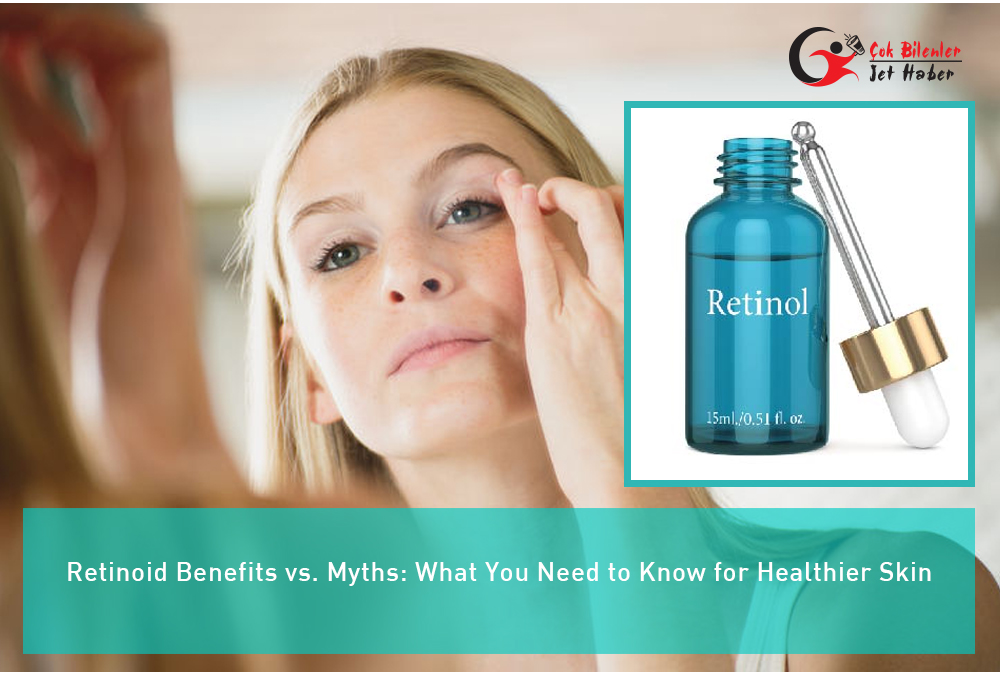Retinoid Benefits vs. Myths: What You Need to Know for Healthier Skin
What Is a Retinoid?
Retinoids are a group of compounds that contain vitamin A. They are primarily used to help improve the health and appearance of the skin, as it can help regulate epithelial cell growth.
Retinoid vs. Retinol
What is the difference between retinol and retinoid? The term retinoids describes various products containing retinol.
Retinol is converted to retinoic acid in the form of vitamin A, which really repairs the skin. Studies have found that retinoic acid, the active ingredient in prescription creams, is generally stronger than retinol.
Retinoids are derived from both animal sources and plants that contain active retinol or inactive vitamin A (in the form of beta-carotene that needs to be converted).
The terminology can be confusing considering a number of skin care products that contain ingredients called “R” (retinol, retinoic acid, Retin-A, etc.) containing similar names. Overall, research shows that these products have similar effects and uses, but determines how effective the product’s strength / concentration and how long it has been used.
Types/Varieties
You can find retinoid products both in over-the-counter and prescription forms. Creams, serums and other skin care formulas that are labeled as “retinol” and available in drugs or stores do not require a prescription.
Prescription retinoids have been used since the 1970s. The first type under the brand name Retin-A (drug name tretinoin) was originally created to help treat acne.
It is still prescribed by dermatologists today, now for reasons beyond cleansing.
Recipe formulas often contain retinoic acid, which is already in its “active form” and does not need to be converted after application to the skin. Retinol is described as “softer than retinoic acid”, but it can provide similar results when the two are used consistently.
In addition, there is another group of products called “pro-retinols” (also known as retinyl palmitate, retinyl acetate and retinyl linoleate). These are the most gentle and least likely to cause side effects, but they are weaker and can take longer to benefit.
What are examples of retinoid products?
Whether in the pharmacy or with the help of your dermatologist, you can find other products, including liquid, gel and retinoid cream, retinoid pills (oral retinoids), serums and more. Gels are recommended for people with oily skin, while creams are best for those who are prone to dryness.
Retinoid types include:
- the alitretinoin
- isotretinoin
- tretinoin
- teretinat
- the acitretin
- tazarotene
- adapalene,
- diversity
- seletinoid G
Retinoid prescriptions include:
- Tretinoin (Retin-A, generic)
- Tazarotene (Avage, Tazorac)
- Adapalen (Differin)
- the alitretinoin
- Bexarotene
- Oral isotretinoin (Accutane)
Benefits/Uses
Do retinoids really work? Studies show that retinoid benefits can include:
- Acne reduction
- Reducing fine lines and wrinkles by preventing distortion of damaged dermal matrix exposed to UV rays
- Withered actinic keratosis spots (may be precancerous skin cells)
- Evening pigmentation, fading age spots and improving the overall tone / color of the skin
- Accelerate the turnover of superficial skin cells
- Fighting psoriasis and warts
- Treatment of pigment disorders
- Prevention of water loss in the skin
- Help fight specific types of skin cancer, as retinoids regulate cell apoptosis, differentiation, and proliferation
More about how retinoid products work:Is retinoids good for skin?,Why you shouldn’t use retinol?,Should you use retinol every day?,Does Retinol thin or thicken skin?,At what age should you start using retinol?,What should you not use retinol with?,Can retinol make you look older?,Do you moisturize after retinol?,Does Retinol damage skin barrier?,Does Retinol make your skin thicker?,Can thin skin be made thicker?,Can I use vitamin C in the morning and retinol at night?,Is it OK to put retinol under eyes?,Can I use moisturizer after retinol?,What happens if you use too much retinol?
1. Can Help Fight Signs of Aging
Vitamin A and retinol have been shown to regulate a large number of transcription factors found in the nucleus of various cells. This means they can improve skin health at the cellular level.
Research has shown that retinoid beauty treatments can help prevent wrinkles, streaks and age spots by increasing collagen production and preventing collagen loss. Collagen is a protein that helps create skin, as well as other connective tissues in the body.
Another mechanism is to stimulate the production of new blood vessels in the skin.
People who use retinoid cream and serum tend to notice that their skin looks more elastic and firmer. For stronger anti-aging effects, some people choose to combine retinoid creams (such as the most powerful and widely used therapy for photo aging, tretinoin) with alpha hydroxy acids (AHAs).
2. Fights Acne
Retinoids are one of the most frequently prescribed products by the dermatologist for the treatment of mild to moderate acne. According to the American Academy of Dermatology, “retinoids are the core of topical treatment for acne because they are comedolytic, they resolve the leading microcomedon lesion, are anti-inflammatory and allow the preservation of clearance.”
In other words, they can help stop breaks by blocking clogged pores and removing dead skin cells. They also work with topical antibiotics to eliminate acne-causing bacteria.
When someone has moderate to severe acne, retinoid pills can be prescribed. While side effects are common, these can help treat oil production, kill bacteria, and reduce inflammation.
3. Helps Improve Skin Tone/Pigmentation
What is impressive about retinol is that it can affect the skin not only at the cellular level, but also at the genetic level. Studies show that these products can affect gene expression, resulting in smoother skin, smoothing rough spots, and even more pigmentation.
Retinoids are also used in the treatment of pigmented disorders, some of which are normally difficult to manage. They can help reduce symptoms caused by inflammatory hyperpigmentation, melasma, and actinic lentigins.
4. Can Reduce Psoriasis Symptoms
Retinoids can help reduce hyperproliferation and shedding of epidermal skin cells that contribute to psoriasis. They are also used to control inflammation and restore normal epidermal differentiation.
Myths
Here are some common legends that turned out to be untrue about retinoids, although many people think:
- If it causes irritation, you should stop using it. Fact: It is common for these products to cause mild reactions such as redness, dryness, and even some peeling for the first one to two weeks. While your skin is being adjusted, you can continue using small amounts, as long as your reaction is not serious or painful.
- Stronger products are better. Fact: Using a concentrated product can be too much for your skin to function at first, which can trigger strong side effects. It is best to start using a weaker product, and after you learn that it is well tolerated, gradually switch to a stronger retinoid. While some dermatologists think tazarotene is stronger than tretino, adapalene is considered to be the most gentle.
- Smoothes the skin with exfoliation. Fact: Unlike other ingredients that really exfoliate the skin by removing dead skin cells, retinoids work differently at the cellular level. They can cause your skin to peel, but it’s not actually the benefits of softening.
- They work fast. Fact: If you don’t use retinoids regularly for about 12 weeks or more, you probably won’t notice the real result.
Dosage
The retinoid cream tends to be strong depending on its type, so usually applying just a few drops or a pea-sized amount is enough to see the results. If you are using a retinoid prescription, carefully follow your doctor’s dose recommendation to avoid side effects.
Prescription topical retinoids are usually present in a 0.1 percent strength formulation, while prescriptions can contain 0.3 percent retinol. Ideally, buy a product packaged with aluminum, as this prevents changing the formula due to exposure to air and light.
When you first start using these products, just apply them every three days or two days to give your skin time to adjust. Then, as long as you do not experience any adverse effects, gradually proceed to the nightly applications.
Most specialists take retinol cream, serum, etc. at night. It recommends you use it, because sunlight can change the way this component works. If you wait 15 to 20 minutes after washing your face before applying, you can absorb the product in the best way.
Since retinoids can increase peeling and redness (although there is absolutely no sensitivity to light according to some recent studies), most dermatologists recommend using sunscreen during the day and / or being careful to limit exposure to direct sunlight.
Where should you apply these products on your face?
You can put it all over your face in a thin layer, up to your eyes (but not your eyes). Apply your favorite moisturizer on it.
You can also apply it to your neck, chest, hands, and forearms.
How long do you need to use retinoid products to see the developments in your skin?
Most studies have found regular use of about three to six months before seeing remarkable results. Most people get the best results if they use retinoid creams and other products for about six to 12 months.
Would you like to try to make your own retinol cream at home?
Try this recipe for DIY Rosehip Retinol Cream with Lavender. These skin nourishing recipes use moisturizing and anti-aging ingredients such as rosehip seed oil, carrot seed oil, shea butter, green tea extract, lavender essential oil, and sweetgum oil.
Risks and Side Effects
Are retinoids safe? Although they are generally safe for most people when used in recommended doses, some people may experience adverse reactions when using retinoid products, especially if they have sensitive skin or if they are using too much.
Side effects are most common when you start using retinoids or switch to a stronger product.
It is possible that retinoid side effects include:
- Dry skin and peeling
- Redness and irritation
- Sunburn
- Slight burning sensation or warmth to the skin
- Stinging and tingling
- Itching
- Slight discoloration of the skin
To limit side effects, use a small amount before a weaker product. You can also moisten it on your retinoid to prevent excessive dryness.
In addition, be careful not to over-wash your face, which can increase irritation or not spend a lot of time in the sun.
If you notice signs of an allergic reaction, such as hives and swelling, stop using this product and consult your doctor. If you are pregnant or breastfeeding, get your doctor’s opinion before using these products.
- Result
What is a retinoid? Retinoids are skin care products that contain the retinol component, a derivative of vitamin A. - Retin-A is a popular type of retinoid cream that requires a prescription. There are many other types that can also be effective on the countertop.
- The benefits of these products include acne, wrinkles, dark spots, irregular pigmentation, clogged pores, and skin inflammation treatment.
- It is best to start with a weak product first to accommodate your skin. Next, consider using a more powerful product, such as that available at about 0.3 percent forces.
- Some side effects may occur initially, such as redness, dryness, and peeling. These should be resolved within a few weeks.
- The best results are seen when these products are used for at least 12 weeks, ideally up to a year.














Comments